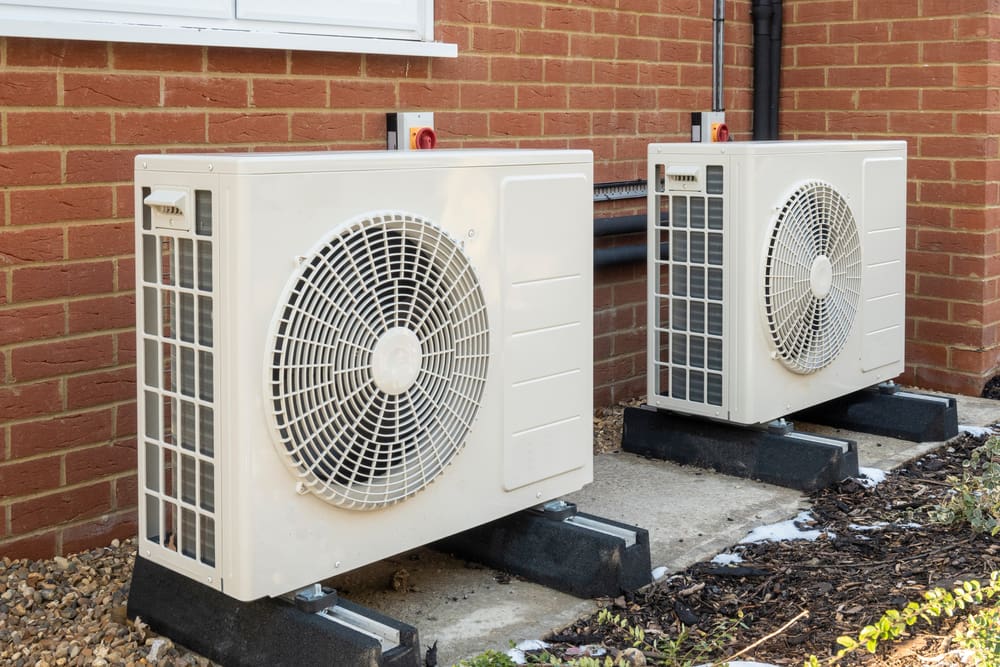When you’re choosing an HVAC system for your home, most homeowners go with a heat pump or air conditioning (AC) unit. Understanding the difference between these two systems is crucial in making an informed decision about which one is right for your home. In this blog, we will delve into the main differences, similarities, and pros and cons between heat pumps and air conditioners.
What Is a Heat Pump & How Does It Work?
Heat pumps are a versatile HVAC system that is popular among homeowners because it’s designed to heat and cool your home using the same technology as an air conditioner. During the summer, a heat pump in “cool mode” will take the heat from inside your home and release it outside. In the winter, heat pumps reverse their cooling cycle to take the hot air from outside and move into your home. Heat pumps are unique in that they use a reversing valve to switch from cooling to heating. The components of a heat pump include a compressor, evaporator coil, condenser coil, and reversing valve.
How Does an Air Conditioner Work?
An air conditioner is the most well-known (and loved) HVAC system homeowners are familiar with and probably have. The AC unit has three components, these are the compressor, the condenser, and the evaporator. These components change the state, pressure, and temperature of the refrigerant in your AC unit so that it absorbs heat. Your unit’s compressor and condenser are typically located outside of your home and the evaporator is inside.
Your air conditioning unit functions by taking hot air from inside your home and transferring it outside. It does this by first absorbing hot air (inside your home) through the evaporator coils (in the AC unit). Then, that heat is pressurized through the compressor which raises the refrigerant temperature. The refrigerant, now a superheated vapor, travels to the condenser (which is located outdoors) and is released outside. The heat from the refrigerant cools down once it’s outside, changing the state from a gas back into a liquid. Once the refrigerant gets cold and your home gets hot, the process repeats.
Comparing Heat Pumps and Air Conditioners
Similarities
Heat pumps are similar to air conditioners in that they are used to cool indoor spaces using a refrigerant cycle. They also share similar components such as a compressor, evaporator, and condenser. Both HVAC systems use the ductwork in your home to send cool air (and hot air for a heat pump) evenly throughout your home. If you don’t have ductwork already in place, you will need to have it installed before being able to use a heat pump or AC unit.
Differences
There are more differences than similarities between a heat pump and an air conditioning unit. A heat pump’s most prominent difference is that it has dual functionality—meaning it can heat indoor spaces as well as cool them. This is done with a reversing valve which an air conditioner does not have.
Heat pumps are the most energy-efficient HVAC system, according to the Department of Energy (DOE), because they can reduce electricity use for heating by 50% compared to stand-alone heating systems, such as a furnaces. One of the things to keep in mind when choosing a heat pump or AC unit is that since a heat pump does both cooling and heating, if you only have an AC unit, you will need a source of heat, like a baseboard heater or furnace.
Pros and Cons Comparison
| Heat Pump | Air Conditioner | |
| Pros | Use electricity to heat your home—not gas. Very energy efficient. Requires minimal maintenance. | Quickly and efficiently cools large indoor spaces.Filters air—improves indoor air quality and reduces allergens. |
| Cons | Not efficient in climates that are below freezing.Expensive install or upfront cost.Shorter lifespans if they are used year-round vs. seasonally. | Produces the coolest air but uses a lot of electricity to do so.You need a heater or furnace to keep your home warm during the cold months. Higher utility cost and requires seasonal maintenance. |
Factors To Consider When Choosing Your HVAC System
Climate Considerations
A heat pump does very well in mild weather. They do not work efficiently in places that have freezing temperatures. A heat pump pulls heat from outside—even in cold months, there is enough heat to trap and absorb to pull into the home. But if it’s icy and freezing, there may not be enough heat to work as it should, and you may need a supplemental heat source.
An air conditioning unit is great for all types of weather and temperatures, but since they only cool, you will need a heat source. A combination of an AC unit and a natural gas or propane furnace is the most typical route people choose when looking for or replacing their HVAC system but isn’t always the most energy-efficient.
Energy Efficiency Ratings
A heat pump is very energy efficient, and many today have even earned the ENERGY STAR label. Heat pumps use less energy to warm your home because they transfer heat instead of generating it like a conventional electric or gas system. An AC unit uses more electricity to function and needs to be paired with a heat source. These factors make an AC unit less energy efficient and costly in the long run.
Installation and Maintenance Costs
The installation and maintenance costs for heat pumps and air conditioners are similar. Both require regular maintenance, including filter replacements and coil cleanings. Heat pumps may need more frequent servicing due to year-round use. Common repairs for both systems include refrigerant leaks, compressor malfunctions, faulty condensers, blower motor failures, and electrical issues. Establishing a consistent maintenance schedule can prevent minor issues from becoming major repairs.
Both systems have similar life expectancies of 10 to 15 years with proper care. In terms of upfront costs, heat pumps generally cost more than air conditioners. A high-efficiency heat pump can range from $4,200 to $8,500, with complex installations potentially reaching $15,000. Additional electrical or ductwork upgrades will increase the cost. However, since heat pumps replace both air conditioners and furnaces, they can be more affordable down the road. Or, if you’re looking for something with a lower initial cost, air conditioners range from $1,600 to $4,800 for self-installable units, but can increase to around $22,800 for professional installation and high-end products.
Long-Term Operational Cost
In terms of long-term operational costs, heat pumps are more energy-efficient and can lower utility bills, especially in moderate climates. Both systems require similar levels of ongoing maintenance and costs about the same for annual tune-ups.
Find Your Perfect HVAC System at Sunny Services
In case you missed it, here are the most important key takeaways when deciding which HVAC system is right for you:
- Heat pumps and air conditioners function similarly in that they can cool your home/indoor spaces.
- Heat pumps are versatile and can provide both heating and cooling, best suitable for climates that don’t reach freezing.
- Air conditioners only cool your home, and will need a heat source for the cold winter months.
- Heat pumps are more expensive upfront, but can save you money in utilities and can lead to long-term savings.
At Sunny Services, our team of HVAC professionals can answer any questions you may have and give you expert advice on which system is best for your home. We want you to feel peace of mind when you’re investing in your home with top-notch customer service and industry-leading products that will last you over a decade.
Call us today at 817-385-6433 or find us online to schedule an appointment.





